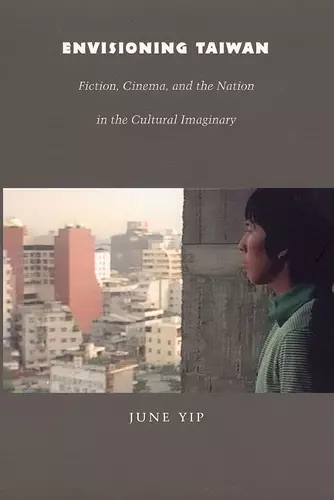Envisioning Taiwan
Fiction, Cinema, and the Nation in the Cultural Imaginary
Format:Hardback
Publisher:Duke University Press
Published:7th Oct '04
Currently unavailable, and unfortunately no date known when it will be back

Traces the growth and evolution of a Taiwan's sense of itself as a separate and distinct entity by examining the diverse ways a discourse of nation has been produced in the Taiwanese cultural imagination.
In discussions of postcolonial nationhood and cultural identity, Taiwan is often overlooked. Yet the island—with its complex history of colonization—presents a particularly fascinating case of the struggle to define a “nation.” While the mainland Chinese government has been unequivocal in its resistance to Taiwanese independence, in Taiwan, government control has gradually passed from mainland Chinese immigrants to the Taiwanese themselves. Two decades of democratization and the arrival of consumer culture have made the island a truly global space. Envisioning Taiwan sorts through these complexities, skillfully weaving together history and cultural analysis to give a picture of Taiwanese identity and a lesson on the usefulness and the limits of contemporary cultural theory.
Yip traces a distinctly Taiwanese sense of self vis-à-vis China, Japan, and the West through two of the island’s most important cultural movements: the hsiang-t’u (or “nativist”) literature of the 1960s and 1970s, and the Taiwanese New Cinema of the 1980s and 1990s. At the heart of the book are close readings of the work of the hsiang-t’u writer Hwang Chun-ming and the New Cinema filmmaker Hou Hsiao-hsien. Key figures in Taiwan’s assertion of a national identity separate and distinct from China, both artists portray in vibrant detail daily life on the island. Through Hwang’s and Hou’s work and their respective artistic movements, Yip explores “the imagining of a nation” on the local, national, and global levels. In the process, she exposes a perceptible shift away from traditional models of cultural authenticity toward a more fluid, postmodern hybridity—an evolution that reflects both Taiwan’s peculiar multicultural reality and broader trends in global culture.
“A splendid book on Taiwan, its culture, and its unique situation in the world.”—Fredric Jameson, Duke University
“June Yip forcefully argues why and how modern Taiwanese literature and cinema matter for our understanding of an array of modern and postmodern issues ranging from national identity to cultural politics and from an indigenous search for roots to global circulation of cultural and economic capital.”—David Der-wei Wang, author of The Monster That Is History: History, Violence, and Fictional Writing in Twentieth-Century China
“June Yip’s book on contemporary Taiwanese fiction and film is a readable and theoretically-informed treatment that has aspirations to cover the Taiwan xiangtu literature movement and the emergence of New Taiwan Cinema.” -- Christopher Lupke * Chinese Literature *
"Envisioning Taiwan is a brilliant analysis of the present state and nature of Taiwanese culture. . . . What is so very remarkable about this book is that Yip challenges the orthodoxies of both the political blues and the political greens in Taiwan. While the greens have undoubtedly embraced a vision of a Taiwan of far more mixed origins than was allowed by the old Confucian paradigms, the blues for their part have tried to claim an internationalism that contrasts with the greens' allegedly more local viewpoint." -- Bradley Winterton * Taipei Times *
"Extraordinary. . . . Yip proposes that this lack of an agreed status that supposedly bedevils Taiwan may not be such a bad thing. . . . Far from being a territory sidelined from international affairs, . . . hi-tech, multicultural Taiwan may be blazing a trail into the future of all mankind. . . . The concept is a fascinating one. . . . Yip is to be congratulated. If the idea gains currency, it could set the cat among a wide variety of pigeons." -- Bradley Winterton * South China Morning Post *
"The book identifies and analyses in a rather convincing and well-documented manner the most crucial texts of the formation of a new Taiwan." -- Ping-Hui Liao * The China Quarterly *
ISBN: 9780822333579
Dimensions: unknown
Weight: 649g
368 pages